
Peter Michael Falk was an American film and television actor, comedian, singer and television director and producer. He is best known for his role as Lieutenant Columbo on the NBC/ABC series Columbo, for which he won four Primetime Emmy Awards and a Golden Globe Award (1973). In 1996, TV Guide ranked Falk No. 21 on its 50 Greatest TV Stars of All Time list. He received a posthumous star on the Hollywood Walk of Fame in 2013.

Grand Hotel is a 1932 American pre-Code drama film directed by Edmund Goulding and produced by Metro-Goldwyn-Mayer. The screenplay by William A. Drake is based on the 1930 play of the same title by Drake, who had adapted it from the 1929 novel Menschen im Hotel by Vicki Baum. To date, it is the only film to have won the Academy Award for Best Picture without being nominated in any other category.

Charles Patrick Ryan O'Neal is an American actor and former boxer. He trained as an amateur boxer before beginning his career in acting in 1960. In 1964, he landed the role of Rodney Harrington on the ABC nighttime soap opera Peyton Place. It was an instant hit and boosted O'Neal's career. He later found success in films, most notably in the romantic drama Love Story (1970), for which he was nominated for the Academy Award for Best Actor and the Golden Globe Award for Best Actor – Motion Picture Drama, Peter Bogdanovich's What's Up, Doc? (1972) and Paper Moon (1973), which earned him a nomination for the Golden Globe Award for Best Actor – Motion Picture Musical or Comedy, Stanley Kubrick's Barry Lyndon (1975), Richard Attenborough's A Bridge Too Far (1977), and Walter Hill's The Driver (1978). From 2005 to 2017, he had a recurring role in the Fox television series Bones as Max, the father of the show's protagonist.

Robert Burgess Aldrich was an American film director, producer, and screenwriter. An iconoclastic and maverick auteur working in many genres during the Golden Age of Hollywood, he directed mainly films noir, war movies, westerns and dark melodramas with Gothic overtones. His most notable credits include Vera Cruz (1954), Kiss Me Deadly (1955), The Big Knife (1955), Autumn Leaves (1956), Attack (1956), What Ever Happened to Baby Jane? (1962), Hush...Hush, Sweet Charlotte (1964), The Flight of the Phoenix (1965), The Dirty Dozen (1967), and The Longest Yard (1974).

Gloria Grahame Hallward was an American actress. She began her acting career in theatre, and in 1944 made her first film for MGM.

Too Late the Hero is a 1970 American war film directed by Robert Aldrich and starring Michael Caine, Cliff Robertson, Ian Bannen and Harry Andrews.
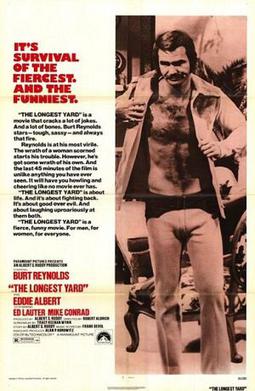
The Longest Yard is a 1974 American prison sports comedy film directed by Robert Aldrich, written by Tracy Keenan Wynn, based on a story by producer Albert S. Ruddy, and starring Burt Reynolds, Eddie Albert, Ed Lauter, Mike Conrad and James Hampton. The film was released as "The Mean Machine" in the United Kingdom and South Africa. The film follows a former NFL player recruiting a group of prisoners and playing football against their guards. It features many real-life football players, including Green Bay Packers legend Ray Nitschke.
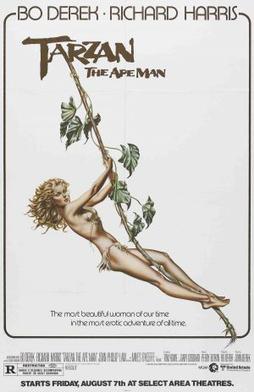
Tarzan, the Ape Man is a 1981 American adventure film directed by John Derek and starring Bo Derek, Miles O'Keeffe, Richard Harris, and John Phillip Law. The screenplay by Tom Rowe and Gary Goddard is loosely based on the 1912 novel Tarzan of the Apes by Edgar Rice Burroughs, but from the point of view of Jane Parker.
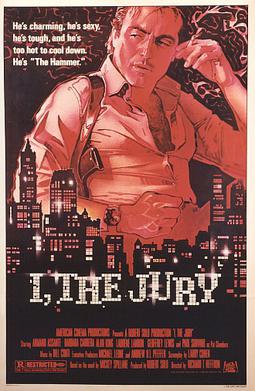
I, the Jury is a 1982 American neo-noir crime thriller film based on the 1947 best-selling detective novel of the same name by Mickey Spillane. The story was previously filmed in 3D in 1953. Larry Cohen wrote the screenplay and was hired to direct, but was replaced when the film's budget was already out of control after one week of shooting. He was replaced at short notice by veteran TV director Richard T. Heffron.

Laurene Landon Coughlin is a Canadian film and television actress. She first began appearing in movies in the 1980s. She is best known for her roles in Maniac Cop (1988) and Maniac Cop 2 (1990), ...All the Marbles (1981), Airplane II: The Sequel (1982), I, the Jury (1982) and Hundra (1983).

Tarzan Goes to India (1962) is the first film featuring Jock Mahoney as Tarzan. The twenty-fourth film of the Tarzan film series that began with 1932's Tarzan the Ape Man, it was written by Robert Hardy Andrews and directed by John Guillermin, who also directed Tarzan's Greatest Adventure. The film also stars Indian Bollywood actors Feroz Khan, Simi Garewal and Murad in pivotal roles. It was followed by Tarzan's Three Challenges (1963) which was set in Thailand. It was one of two Mahoney films that took Tarzan out of Africa and sent him to the Far East. It was a co-production between Switzerland, the United Kingdom and the United States. Jock Mahoney had appeared as the villain in the previous Tarzan film, Tarzan the Magnificent.

The Carey Treatment is a 1972 American crime thriller film directed by Blake Edwards and starring James Coburn, Jennifer O'Neill, Dan O'Herlihy and Pat Hingle. The film was based on the 1968 novel A Case of Need credited to Jeffery Hudson, a pseudonym for Michael Crichton. Like Darling Lili and Wild Rovers before this, The Carey Treatment was heavily edited without help from Edwards by the studio into a running time of one hour and 41 minutes; these edits were later satirized in his 1981 black comedy S.O.B..
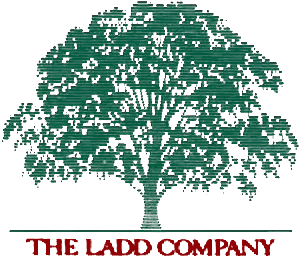
The Ladd Company was an American film production company founded by Alan Ladd Jr., Jay Kanter, and Gareth Wigan in 1979.
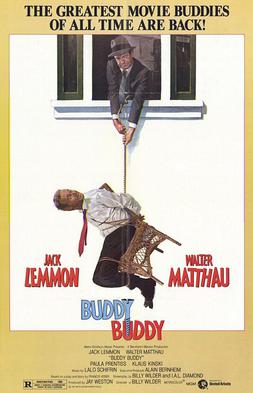
Buddy Buddy is a 1981 American comedy film based on Francis Veber's play Le contrat and Édouard Molinaro's film L'emmerdeur. It was the final film directed and written by Billy Wilder.

Big Leaguer is a 1953 American sports drama film starring Edward G. Robinson and was the first film directed by Robert Aldrich.

The Choirboys is a 1977 American comedy-drama film directed by Robert Aldrich, written by Christopher Knopf and Joseph Wambaugh based on Wambaugh's 1975 novel of the same name. It features an ensemble cast including Charles Durning, Louis Gossett Jr., Randy Quaid, and James Woods. The film was released to theaters by Universal Pictures on December 23, 1977.

"Oh, You Beautiful Doll" is a ragtime love song published in 1911 with words by Seymour Brown and music by Nat D. Ayer. The song was one of the first with a twelve-bar opening.
Faith Minton is an American television and film actress and stuntwoman.

The Angry Hills is a 1959 American-British war film directed by Robert Aldrich and starring Robert Mitchum, Stanley Baker and Elisabeth Müller. It is based on the novel by Leon Uris.

The Legend of Lylah Clare is a 1968 American drama film released by Metro-Goldwyn-Mayer and directed by Robert Aldrich. The film stars Peter Finch, Kim Novak, Ernest Borgnine, Michael Murphy, and Valentina Cortese. The film was based on a 1963 DuPont Show of the Week TV drama of the same name co-written by Wild in the Streets creator Robert Thom.



















